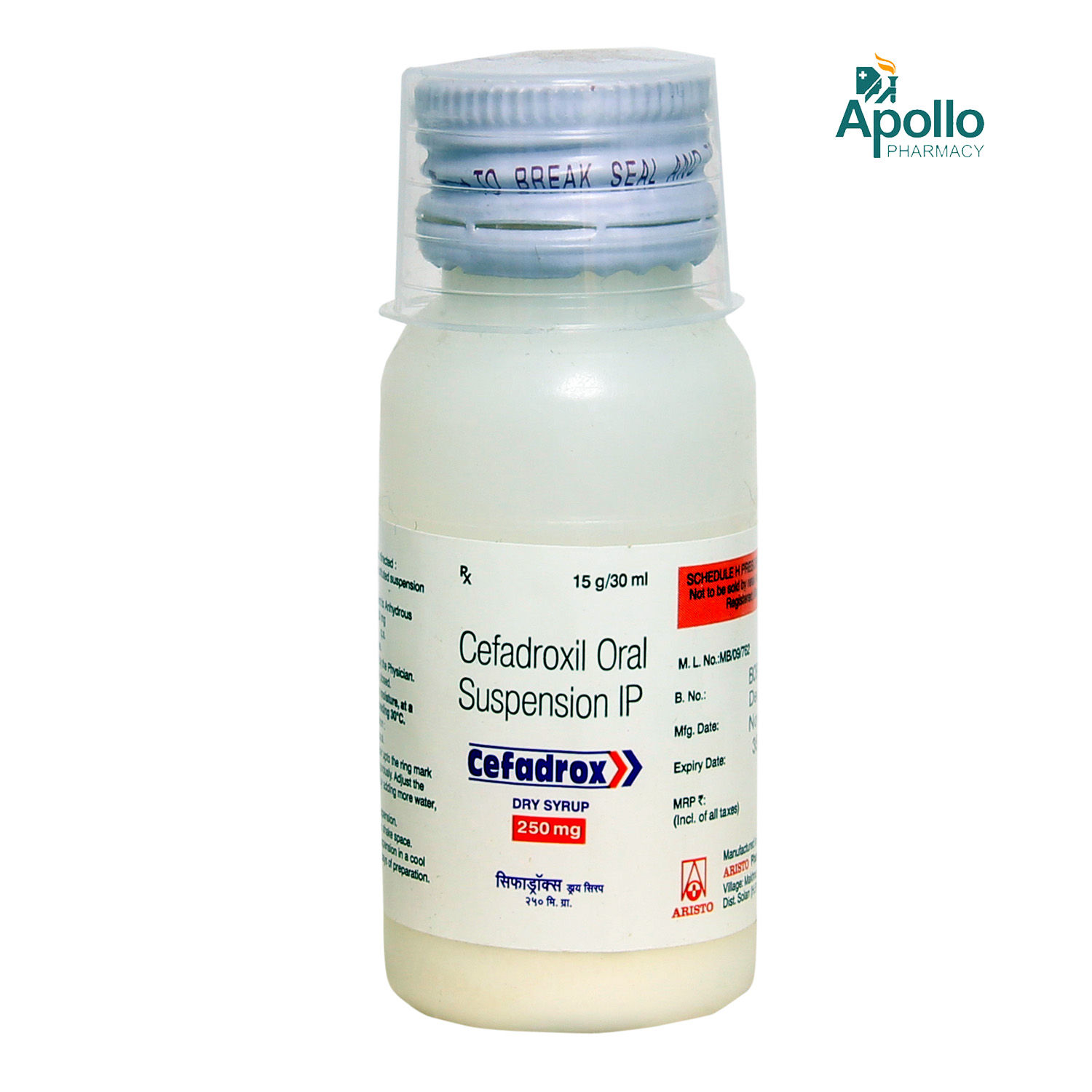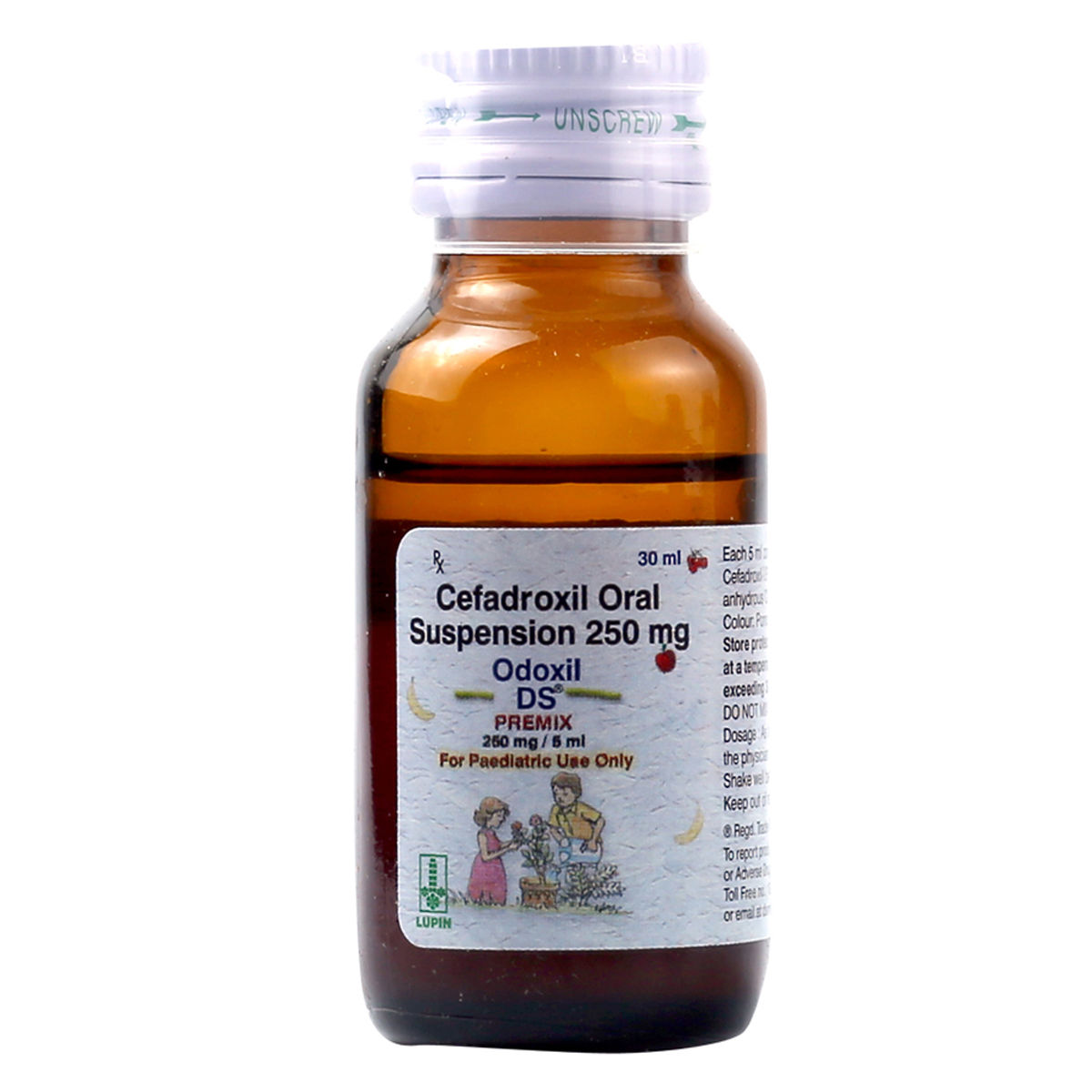Cefadur Rediuse 250 mg Syrup 30 ml
₹26.55*
MRP ₹29.5
10% off
₹25.07*
MRP ₹29.5
15% CB
₹4.43 cashback(15%)
Free Delivery
With Circle membership
(Inclusive of all Taxes)
This offer price is valid on orders above ₹800. Apply coupon PHARMA10/PHARMA18 (excluding restricted items)
Know Your Delivery Time
Provide Delivery Location

Available Offers
 Prescription drug
Prescription drugWhats That

Secure Payment

India's Most Trusted Pharmacy

Genuine Products
Composition :
Manufacturer/Marketer :
Consume Type :
Return Policy :
Expires on or after :
About Cefadur Rediuse 250 mg Syrup
Cefadur Rediuse 250 mg Syrup belongs to the class of cephalosporin antibiotics. It is used to treat upper respiratory tract bacterial infections, the skin and soft tissue, and the urinary system. Bacterial infections are caused due to the multiplication of harmful bacteria inside or on the body. Infectious or harmful bacteria can make you sick and reproduce quickly in your body. These harmful bacteria produce chemicals known as toxins, which can damage tissue and make you sick.
Cefadur Rediuse 250 mg Syrup contains cefadroxil, which is a new semisynthetic cephalosporin with a broad antibacterial spectrum and a high chemotherapeutic potential when administered orally. It kills the bacteria by inhibiting cell wall synthesis, leading to cell death. Thereby it treats bacterial infections.
Use Cefadur Rediuse 250 mg Syrup as suggested by the doctor. Your doctor will advise the dose and duration based on the severity of your infection. Like all medicines, Cefadur Rediuse 250 mg Syrup also causes side effects, although not everybody gets them. Common side effects of Cefadur Rediuse 250 mg Syrup include diarrhoea, nausea, vomiting, sore tongue, abdominal pain, dyspepsia (indigestion), skin rash, and itching. Most of these side effects do not require medical attention and will resolve gradually over time. However, you are advised to talk to your doctor if you experience these side effects persistently.
Before starting Cefadur Rediuse 250 mg Syrup, please inform your doctor if you have any allergy to any antibiotic or kidney or liver problems. Do not take the Cefadur Rediuse 250 mg Syrup on your own, as self-medication may lead to antibiotic resistance in which antibiotics fail to act against specific bacterial infections. Consult your doctor before taking the Cefadur Rediuse 250 mg Syrup if you are pregnant or breastfeeding. Avoid alcohol consumption while taking Cefadur Rediuse 250 mg Syrup as it may cause increased dizziness.
Uses of Cefadur Rediuse 250 mg Syrup
Directions for Use
Medicinal Benefits
Cefadur Rediuse 250 mg Syrup belongs to the class of cephalosporin antibiotics. It reduces the infection by inhibiting bacterial growth. It kills the bacteria by disrupting the formation of the cell wall. It irreversibly binds to the proteins in the bacteria that are essential for the formation of the cell membrane. Thereby it treats bacterial infections. Cefadur Rediuse 250 mg Syrup is a broad-spectrum antibiotic that is effective against both gram-positive and gram-negative bacteria.
How Cefadur Rediuse 250 mg Syrup Works
Storage
Side Effects of Cefadur Rediuse 250 mg Syrup
- Nausea
- Vomiting
- Diarrhoea
- Indigestion
- Abdominal pain
- Severe itching
- Rash
- Allergic skin eruptions
- Hives
- A swollen, sore tongue
What if I have taken an overdose of Cefadur Rediuse 250 mg Syrup
Drug Warnings
Before taking Cefadur Rediuse 250 mg Syrup, tell your doctor if you are allergic to cefadroxil, cephalosporin antibiotics, or penicillin. People allergic to penicillin may also experience an allergy to cefadroxil due to cross-sensitivity (sensitivity to one drug may cause sensitivity to another drug if they have a similar chemical structure). You may experience ‘Clostridium difficile associated diarrhoea (CDAD)’ after using Cefadur Rediuse 250 mg Syrup. So, tell your doctor if you are previously diagnosed with gastrointestinal disease (affecting the stomach or intestine), especially colitis (inflammation of the inner lining of the colon (large intestine)). In addition, tell your doctor if you have a history of kidney disease, as dosage adjustments are necessary.
Diet & Lifestyle Advise
- It would be best to take probiotics after taking the full course of Cefadur Rediuse 250 mg Syrup to restore some healthy bacteria in the intestine that may have been killed. Taking probiotics after antibiotic treatment can reduce the risk of antibiotic-associated diarrhoea. Certain fermented foods like yoghurt, cheese, sauerkraut and kimchi can help restore the intestine's good bacteria.
- Include more fibre-enriched food in your diet, as it can be easily digested by gut bacteria which helps stimulate their growth. Thus fibre foods may help restore healthy gut bacteria after taking a course of antibiotics. Whole grains, like whole-grain bread, and brown rice, should be included in your diet.
- Avoid taking too much calcium-enriched foods and drinks as it might affect the working of Cefadur Rediuse 250 mg Syrup.
- Avoid intake of alcoholic beverages with Cefadur Rediuse 250 mg Syrup as it can make you dehydrated and affect your sleep. This can make it harder for your body to aid the Cefadur Rediuse 250 mg Syrup in fighting off infections.
Habit Forming
Therapeutic Class
Cefadur Rediuse 250 mg Syrup Substitute

Cefadrox 250 mg Syrup 30 ml
₹1.52per tabletCefadrox Kid 250 mg Tablet 10's
₹4.55per tabletDroxyl 250 DT Tablet 10's
₹4.68per tabletDROXYL SUSPENSION 30ML
₹0.81per tabletDroxyl Instause 250 mg Syrup 30 ml
₹0.81per tablet
Product Substitutes
Alcohol
Caution
Intake of alcohol while taking Cefadur Rediuse 250 mg Syrup may increase the risk of side effects.
Pregnancy
Caution
Cefadur Rediuse 250 mg Syrup is a category B medicine. It should be used in pregnant women only when required and prescribed by your doctor.
Breast Feeding
Caution
Cefadur Rediuse 250 mg Syrup may be excreted in breast milk in low amounts. So, it should be used with caution in breastfeeding mothers.
Driving
Safe if prescribed
Cefadur Rediuse 250 mg Syrup should not affect your ability to drive or use machines.
Liver
Caution
Cefadur Rediuse 250 mg Syrup to be taken with caution, especially if you have a history of liver diseases/conditions. Cefadur Rediuse 250 mg Syrup dose may have to be adjusted by your doctor.
Kidney
Caution
Cefadur Rediuse 250 mg Syrup should be used in patients with kidney diseases with extreme caution as Cefadur Rediuse 250 mg Syrup may cause renal toxicity. Dose adjustments are necessary.
Children
Caution
Cefadur Rediuse 250 mg Syrup should be given to children only if prescribed by a doctor. The dose and duration may vary depending upon the age and severity of the infection.
FAQs
Country of origin
Manufacturer/Marketer address
Disclaimer
Author Details
We provide you with authentic, trustworthy and relevant information
















